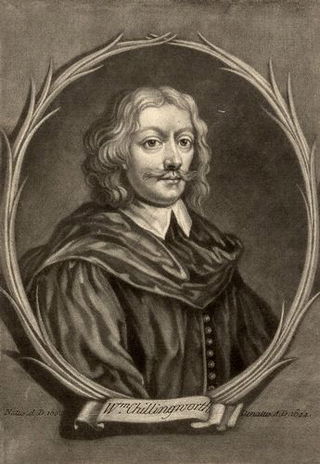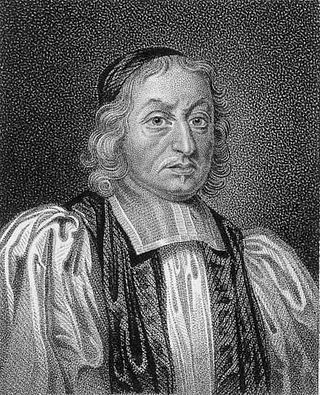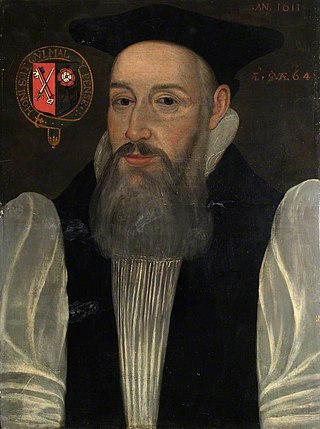Related Research Articles

Joseph Hall was an English bishop, satirist and moralist. His contemporaries knew him as a devotional writer, and a high-profile controversialist of the early 1640s. In church politics, he tended in fact to a middle way.

William Chillingworth was a controversial English churchman.

Thomas Morton was an English churchman, bishop of several dioceses. Well-connected and in favour with James I, he was also a significant polemical writer against Roman Catholic views. He rose to become Bishop of Durham, but despite a record of sympathetic treatment of Puritans as a diocesan, and underlying Calvinist beliefs shown in the Gagg controversy, his royalism saw him descend into poverty under the Commonwealth.
Richard Crashaw was an English poet, teacher, High Church Anglican cleric and Roman Catholic convert, who was one of the major metaphysical poets in 17th-century English literature.

Samuel Harsnett, born Samuel Halsnoth, was an English writer on religion and Archbishop of York from 1629.

Bishop Richard Corbet was an English clergyman who rose to be a bishop in the Church of England. He is also remembered as a humorist and as a poet, although his work was not published until after his death.

John Goodwin (1594–1665) was an English preacher, theologian and prolific author of significant books.
John Floyd was an English Jesuit, known as a controversialist. He is known under the pseudonyms Daniel à Jesu, Hermannus Loemelius, and George White under which he published.

John Pearson was an English theologian and scholar.

John Weever (1576–1632) was an English antiquary and poet. He is best known for his Epigrammes in the Oldest Cut, and Newest Fashion (1599), containing epigrams on Shakespeare, Ben Jonson, and other poets of his day, and for his Ancient Funerall Monuments, the first full-length book to be dedicated to the topic of English church monuments and epitaphs, which was published in 1631, the year before his death.
Richard Montagu was an English cleric and prelate.

John Overall (1559–1619) was the 38th bishop of the see of Norwich from 1618 until his death one year later. He had previously served as Bishop of Coventry and Lichfield, as Dean of St Paul's Cathedral from 1601, as Master of Catharine Hall from 1598, and as Regius Professor of Divinity at Cambridge University from 1596. He also served on the Court of High Commission and as a Translator of the King James Version of the Bible.

The Caroline Divines were influential theologians and writers in the Church of England who lived during the reigns of King Charles I and, after the Stuart Restoration, King Charles II. There is no official list of Caroline-era divines; they are defined by the era in which they lived, and Caroline Divines hailed from England, Ireland, Scotland, and Wales. However, of these four nations, it is Caroline England which is most commonly considered to have fostered a golden age of Anglican scholarship and devotional writing, despite the socio-cultural upset of civil war, regicide, and military rule under Oliver Cromwell. Importantly, the term divine is restricted neither to canonised saints nor to Anglican figures, but is used of many writers and thinkers in the wider Christian church.

Thomas Bilson was an Anglican Bishop of Worcester and Bishop of Winchester. With Miles Smith, he oversaw the final edit and printing of the King James Bible.
John Burges (Burgess) (1563–1635) was an English clergyman and physician. He held nuanced reformist views on the vexed questions of the time, on clerical dress and church ceremonies. His preaching offended James I of England, early in his reign, and Burges went abroad for medical training. He spent many years building up a practice, and only resumed a relationship of conformity within the Church of England in the 1620s.

The reign of Elizabeth I of England, from 1558 to 1603, saw the start of the Puritan movement in England, its clash with the authorities of the Church of England, and its temporarily effective suppression as a political movement in the 1590s by judicial means. This led to the further alienation of Anglicans and Puritans from one another in the 17th century during the reigns of King James and King Charles I, that eventually brought about the English Civil War, the brief rule of the Puritan Lord Protector of England Oliver Cromwell, the English Commonwealth, and as a result the political, religious, and civil liberty that is celebrated today in all English speaking countries.

Arminianism was a controversial theological position within the Church of England particularly evident in the second quarter of the 17th century. A key element was the rejection of predestination. The Puritans fought against Arminianism, and King James I of England opposed it before, during, and after the Synod of Dort, 1618–1619, where the English delegates participated in formulating the Calvinist Canons of Dort, but his son Charles I, favoured it, leading to deep political battles. The Methodists, who espoused a variant of the school of thought called Wesleyan–Arminian theology, branched off the Church of England in the 18th century.
Thomas Paget was an English Puritan clergyman, controversialist and theologian, committed to a Presbyterian church order. As a minister in Manchester, he was an early opponent of Laudian ceremonies in the Church of England. He served the English Reformed Church, Amsterdam, and later at Shrewsbury was a strong supporter of the regicide and of the republican Commonwealth of England. He spent his final year as rector of Stockport.
Bridget Pagetnée Masterson was an English Puritan who acted as her husband John Paget's literary executor and editor.
Ralph Cudworth was a scholar and conforming Anglican clergyman of puritan sympathy who is best known as the father of the philosopher Ralph Cudworth (1617–88), and the Plymouth Colony emigrant, soldier, and colonist, General James Cudworth (1612–82).
References
- Stephen Wright, ‘Covell, William (d. 1613)’, Oxford Dictionary of National Biography, Oxford University Press, 2004